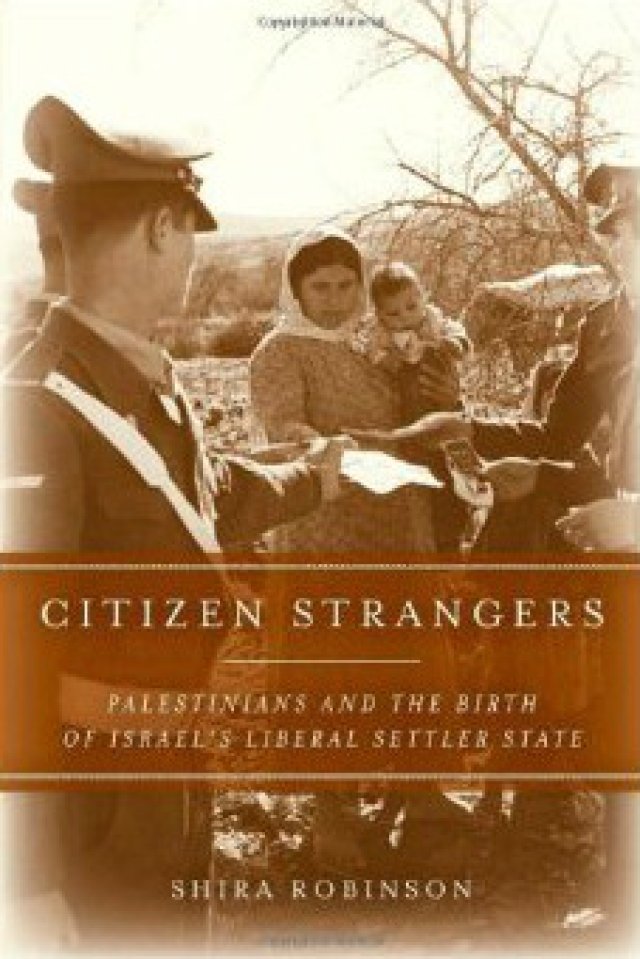
Citizen Strangers: Palestinians & the Birth of Israel's Liberal Settler State
Shira Robinson
Standford University Press, 2013
352pp, US$24.95
If anyone still believes that the apartheid label applies only to Israel’s occupation of Gaza and the West Bank, and not to present-day Israel itself, they need only read Shira Robinson’s Citizen Strangers: Palestinians and the Birth of Israel’s Liberal Settler State to be disabused of the notion.
Robinson, an associate professor of history at George Washington University in the US, draws extensively on Israeli state archives, oral history interviews with Palestinian citizens of Israel, and many other primary sources.
What distinguishes Robinson’s study is her in-depth look at the period of military rule over the largely rural Palestinian population from 1948 to 1966 and her analysis of the settler-colonial mentality that guided the Israeli state’s bid to recast Palestinians as strangers in their own land.
Robinson examines the contradictions that emerged from Israel’s foundation as a colonial state that expelled hundreds of thousands of Palestinians to establish a “democracy” for the new Jewish majority.
She defines Israel as a “liberal” settler state because it had to grant voting and other limited rights to those Palestinians who escaped being forcibly expelled. This was driven by the need to gain admission to the United Nations and present a facade of liberal democracy to the rest of the world.
But Robinson makes clear that the Jewish settler community guaranteed an “array of social and political privileges” for themselves alone.
About 100,000 Palestinians remained within Israel after the 1949 armistice. Having achieved its stated goal of at least an 80% Jewish majority to prevent the potential inclusion of any Palestinian political parties in a coalition government, Israel then confiscated Palestinian land. About 500 Palestinian towns and villages were razed and 90% of Palestinians placed under a draconian military regime.
When Israel declared its independence in 1948, the Provisional State Council adopted the laws inherited from the British Mandate. This included the 1945 Defense Emergency Regulations, which allowed military commanders to suspend all civil liberties, including property and habeas corpus rights.
In 1949, the Council added a provision that enabled Israel's defense minister to designate virtually every Palestinian village and town “a closed zone” from which Palestinians could not leave without a permit. Military commanders were also allowed to create “security zones” along the borders that led to the destruction of a further 11 Palestinian villages.
The result, Robinson says, was that “virtually every aspect of daily life required a military pass”. Its purpose was to make the Palestinians utterly dependent on the regime for “their basic means of survival”.
Israeli leaders repeatedly accused Palestinians of representing a dangerous “fifth column” that posed a security risk to the new state. But through an analysis of charges brought against Palestinians for violating the pass laws, Robinson shows the political purpose of the system.
“It was precisely because the authorities did not view those convicted of administrative violations as security risks,” Robinson observes, “that parents were permitted to serve out the jail sentences of their children, and young adults often sat in detention on behalf of their elderly parents.”
In 1957, an advisor to then-prime minister David Ben Gurion candidly admitted in 1957 to the political purpose of military rule. The advisor said if it had not been for the restrictions, the Communist Party, which Palestinians viewed as their main political advocate, “would invite Arab refugees to squat on their ruins, demand their lands back … [and] the return of the refugees. They will form organizations, parties, fronts, anything to make trouble.”
Israeli military rule was brutal, particularly in the border security zones where Palestinian refugees attempting to return to their homes or just to tend their fields were slaughtered under a free-fire-zone policy. Thousands were killed in this way.
One of the more original elements of Citizen Strangers is the depiction of government attempts to get Palestinian citizens of Israel to acknowledge their defeat. Thus, the Knesset, Israel’s parliament, passed laws forcing Palestinians to publicly celebrate Israel’s Independence Day.
Such public relation stunts only further inflamed Palestinian resistance, which Robinson ably documents. She showed how over the years, Palestinians created a kind of “underground railroad” to enable refugees to return. They also found other ways to organise their defense, including civil disobedience, mass protests, petitions and a general strike.
One of the drawbacks for Israel of the liberal settler state was that Palestinians could take advantage of the limited rights they had to resist their ongoing dispossession and curtailment of freedoms.
Robinson concludes that military rule ended in 1966 only because Zionist leaders determined that Jewish colonisation had basically succeeded, particularly after the passage of a 1960 law banning Palestinians from owning, leasing or working on 97% of state-owned land.
But the contradictions of the liberal settler state remain. They have long made Israel inherently unstable, Robinson argues. That instability, she writes, is now greater than ever.
[Abridged from Electronic Intifada. Rod Such is active with Americans United for Palestinian Human Rights and Jewish Voice for Peace.]
Like Green Left Weekly on Facebook and follow us on Twitter.